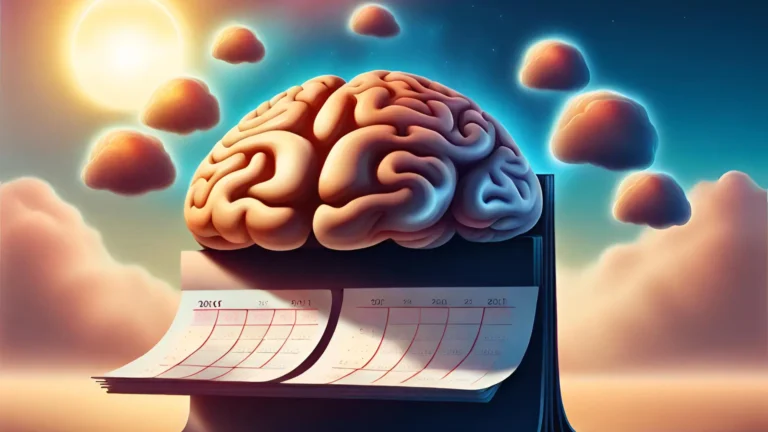Attention Deficit Hyperactivity Disorder (ADHD) is a mental condition that is widely recognized for its symptoms of inattention, hyperactivity, and impulsivity. While ADHD is known even to the common man, another less discussed but impactful aspect is Interruption Anxiety.
Interruption Anxiety occurs when a person is interrupted or distracted from the tasks they were attempting. A heightened sense of distress and disorientation is often experienced when an unexpected distraction occurs.
For individuals with ADHD, these interruptions can significantly derail their focus and emotional equilibrium. This article explores the nuances of interruption anxiety in the context of ADHD, offering practical strategies and insights for effective navigation. Before we dive into interruption anxiety, let’s take a look at ADHD and how it affects people.
What is ADHD?
Attention Deficit Hyperactivity Disorder is known as a neurodevelopmental disorder that affects people through various stages of their lives. It has a wide-ranging impact, affecting everything from daily routine to personal relationships and self-esteem. Let’s take a quick look at ADHD and its effect on people.
1. Cognitive Impact
- Inattention: Difficulty sustaining attention, leading to challenges in completing tasks, staying organized, or following through on commitments.
- Forgetfulness: People with ADHD often struggle with memory issues, like forgetting appointments or misplacing items.
- Difficulty in Task Completion: Procrastination and challenges in completing tasks, especially those that require sustained mental effort or are perceived as mundane.
2. Emotional Effects
- Impulsivity: Impulsiveness can lead to hasty decisions without considering the consequences, affecting various aspects of life.
- Frustration and Low Self-Esteem: Due to ongoing challenges, individuals with ADHD often experience feelings of frustration, low self-esteem, or a sense of underachievement.
- Mood Swings: Emotional dysregulation is common, resulting in quick mood changes.
3. Social and Relationship Impacts
- Social Misunderstandings: Difficulty in reading social cues or maintaining conversations can lead to misunderstandings or strained relationships.
- Conflict in Relationships: Impulsivity and inattention can contribute to conflicts in personal and professional relationships.
- Isolation: Feeling different or misunderstood can lead to social withdrawal.
4. Educational and Professional Challenges
- Academic Struggles: Difficulty focusing, following instructions, and completing assignments often affects academic performance.
- Workplace Challenges: Managing time, meeting deadlines, and maintaining organizational skills can be challenging in professional settings.
5. Positive Aspects of ADHD
- Creativity: Many people with ADHD exhibit high creativity and out-of-the-box thinking.
- Energy and Enthusiasm: Hyperfocus and high energy can be advantageous in certain situations or careers.
- Adaptability: The ability to quickly shift attention can make individuals with ADHD adaptable in dynamic environments.
Understanding ADHD’s impact is crucial for developing effective coping strategies and support systems. It’s important to remember that ADHD manifests differently in each individual, and its effects can vary widely. With proper support, management strategies, and sometimes medication, many people with ADHD lead successful and fulfilling lives. Now that we know all about ADHD and its effect on people let’s understand interruption anxiety.
What Is Interruption Anxiety?
Interruption Anxiety occurs when a person is unexpectedly distracted while attempting a task. It leads to heightened stress and unease, resulting in weaker productivity and an inability to focus correctly. Here are some main characteristics of Interruption Anxiety.
Characteristics Of Interruption Anxiety
- Heightened Stress Response: An interruption, especially during a task requiring concentration, can trigger a stress response. This might manifest as an increased heart rate, frustration, or feeling overwhelmed.
- Difficulty Refocusing: After being interrupted, individuals often find it challenging to regain their previous focus or return to the task at hand. This can lead to decreased productivity and increased anxiety.
- Anticipation of Interruptions: Expecting potential interruptions can cause anxiety, as individuals might feel unable to fully immerse themselves in tasks due to the fear of being disrupted.
- Impact on Work and Personal Life: Interruption anxiety can affect both professional and personal life, making it difficult to complete work tasks efficiently or enjoy leisure activities without worry.
Interruption Anxiety With ADHD
For individuals with ADHD (Attention-Deficit/Hyperactivity Disorder), interruption anxiety can be particularly pronounced. Here’s why:
- Difficulty with Task-Shifting: People with ADHD often have trouble shifting their attention from one task to another. An unexpected interruption can, therefore, be more disruptive and anxiety-provoking.
- Increased Sensitivity to External Stimuli: Many individuals with ADHD are more sensitive to external stimuli, making interruptions more jarring and harder to ignore.
- Challenges in Regaining Focus: Once interrupted, regaining focus can be a significant challenge for someone with ADHD, leading to frustration and increased anxiety about time management and task completion.
- Emotional Dysregulation: ADHD can involve difficulties with emotional regulation, making the stress response to interruptions more intense.
Interruption Anxiety, especially in the case of individuals with ADHD, can affect people negatively. It can interrupt your tasks and make focusing on a specific task harder. Hence, let’s take a look at how to manage interruption anxiety.
How To Manage Interruption Anxiety?
Managing interruption anxiety, especially in our highly connected and fast-paced world, involves a combination of personal strategies, environmental adjustments, and sometimes professional support. Here are some practical ways to manage this type of anxiety:
1. Create a Structured Environment
- Designated Work Area: Establish a specific work or study area separate from high-traffic or noisy parts of your home or office.
- Limit Distractions: Use noise-canceling headphones or play background music or white noise to drown out distracting sounds.
2. Implement Time Management Techniques
- Using Akiflow: Akiflow is a helpful time management application that can help individuals dealing with both ADHD and Interruption Anxiety. With it, you can reduce distractions and increase productivity through timeboxing and timeblocking.
- Pomodoro Technique: Work in focused bursts (e.g., 25 minutes) followed by short breaks. This can help in managing the anxiety of potential interruptions.
- Scheduled Breaks: Plan regular breaks to reduce the stress of constant focus and provide designated times to check emails or social media.
3. Use Technology Wisely
- Notification Settings: Turn off non-essential notifications on your phone and computer during focus periods.
- Communication Tools: Utilize status indicators on communication tools (like Slack or email) to let others know when you’re in deep work mode and less available for interruptions.
4. Develop Personal Coping Strategies
- Mindfulness and Relaxation: Techniques like deep breathing, meditation, or progressive muscle relaxation can help calm the immediate stress response to an interruption.
- Cognitive Behavioral Techniques: Challenge and reframe negative thoughts about interruptions to reduce anxiety.
5. Set Clear Boundaries
- Communicate Needs: Be open with family, friends, and coworkers about your need for uninterrupted time, especially during critical work or relaxation.
- Use Visual Cues: A closed door or a sign can be a clear indicator to others that you are in a focus mode.
6. Plan for Interruptions
- Interruption Journal: Keep track of what disrupts you and plan strategies to mitigate these disruptions.
- Flexibility in Scheduling: Allow buffer times to accommodate unexpected interruptions without causing too much stress.
7. Seek Professional Support if Needed
- Therapy: Therapists can provide personalized strategies to manage anxiety, especially if it’s severely impacting your life.
- ADHD Coaching: For those with ADHD, specialized coaching can offer strategies tailored to the unique challenges of managing interruptions.
8. Practice Self-Compassion
- Acceptance: Understand that some interruptions are inevitable, and it’s okay not to always be perfectly focused.
- Self-Care: Regular exercise, adequate sleep, and a healthy diet can significantly improve your ability to handle stress.
By implementing these strategies, you can create a more controlled environment and mindset that helps in managing interruption anxiety effectively. Remember, it’s about finding what works best for you, as everyone’s situation and coping mechanisms are different.
Battling Interruption Anxiety With Akiflow
Battling interruption anxiety using a tool like Akiflow can be highly effective. Akiflow is a task and calendar management tool designed to streamline your workflow and reduce distractions. Here’s how you can leverage Akiflow to combat interruption anxiety:
- Unified Interface: Akiflow allows you to bring all your tasks and calendars into one place. This centralization helps you avoid the anxiety of switching between multiple platforms and potentially missing essential items.
- Task Prioritization: Use Akiflow to prioritize your tasks. Knowing what needs immediate attention and what can wait reduces the stress of dealing with interruptions.
- Daily Planning: Plan your day in advance with Akiflow. A clear plan can help you quickly reorient yourself after an interruption.
- Time Blocking: Akiflow’s calendar integration lets you create time blocks for focused work. These dedicated periods can help minimize the impact of interruptions, as you know there’s reserved time for deep work.
- Email Integration: With email integration, you can turn emails directly into tasks. This feature prevents the anxiety of an overflowing inbox and keeps you from constantly checking emails.
- Customizable Notifications: Set reminders for tasks and meetings. Knowing that Akiflow will alert you to upcoming obligations can ease the anxiety of forgetting something due to an interruption.
- Efficiency Gains: Akiflow offers a variety of keyboard shortcuts. These can speed up your workflow and minimize the time spent navigating between tasks, reducing the potential for distraction.
- End-of-Day Review: Use Akiflow to review what you’ve accomplished and what needs to be carried over. This helps in managing the anxiety of unfinished tasks.
- Seamless Integration: Connect Akiflow with other tools you use (like Slack, Trello, Asana). This integration helps in keeping all your work in one place, reducing the anxiety of missing out on important updates.
- Schedule Meetings: Akiflow lets you share your availability with others through a bookable link. This way, you will have fewer interruptions, as others will only contact you or schedule a meeting when you are free from all tasks.
By effectively utilizing Akiflow, you can create a more structured and focused work environment, which is crucial in battling interruption anxiety. The key is to leverage its features to suit your unique workflow and needs. Let’s also take a look at some other helpful tips to avoid interruption anxiety.
Avoiding Interruption Anxiety With Akiflow
Avoiding interruption anxiety involves a combination of proactive strategies and mindset shifts to manage the impact of unexpected disruptions. Here are some practical steps you can take by utilizing Akiflow to it’s extent:
- Task Prioritization: Identify high-priority tasks and tackle them during your most focused times.
- Clear To-Do List: Keep a well-organized to-do list to stay on track and reduce the stress of remembering tasks.
- Communicate Availability: Let others know your working hours and times when you prefer not to be disturbed.
- Email and Message Management: Allocate specific times to check and respond to emails and messages.
- Time Blocking: Schedule blocks of time for specific tasks, including short breaks to rest and recharge.
- Pomodoro Technique: Work in focused intervals (e.g., 25 minutes), followed by a short break, to maintain concentration.
- Buffer Time/Rituals: Build in extra time in your schedule to accommodate interruptions without causing anxiety.
Conclusion
In conclusion, interruption anxiety is a common challenge in our increasingly connected world, but it’s not insurmountable. By adopting a structured approach to your work environment, prioritizing and organizing tasks, setting clear boundaries, and utilizing time management techniques, you can significantly mitigate the impact of interruptions.
Embracing technology wisely while also being mindful of its potential to disrupt is key to maintaining focus and productivity. Remember, flexibility and adaptability are crucial. Life is unpredictable, and interruptions are often unavoidable.
Developing a response plan for when these disruptions occur can help you quickly regain your focus and composure. Incorporating mindfulness and stress-reduction practices into your routine will not only assist in managing interruption anxiety but also enhance your overall well-being.

Organising Time with ADHD: A Comprehensive Guide to Calendar Use
Explore effective calendar use strategies tailored for individuals with ADHD. Learn how to harness the power of scheduling to overcome common time management challenges and enhance daily productivity.

ADHD Body Doubling: A Unique way to improve productivity
Discover ADHD Body Doubling: a distinctive productivity technique rooted in the power of human presence. Unveil its significance, especially for those with ADHD, and learn how it can reshape focus and task completion.

How To Hyperfocus With ADHD
Unlock the potential of Hyperfocus in ADHD to boost productivity while avoiding burnout. Explore the connection between ADHD and hyperfocusing, learn to recognise triggers, and harness this ability for personal and professional growth with the aid of tools like Akiflow.

